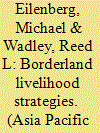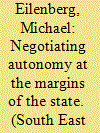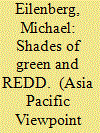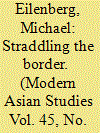|
|
|
Sort Order |
|
|
|
Items / Page
|
|
|
|
|
|
|
| Srl | Item |
| 1 |
ID:
088014


|
|
|
|
|
| Publication |
2009.
|
| Summary/Abstract |
This paper explores cross-border ethnic relations as an important socio-economic strategy for the borderland Iban population in West Kalimantan, Indonesia. Iban seeking more lucrative wage work have long used their ethnic identity to facilitate circular labour migration across the international border into Sarawak, Malaysia, a strategy which has also compromised their claims to Indonesian citizenship. Drawing on long-term field research among the West Kalimantan Iban, we examine the close interconnections among cross-border labour migration, ethnicity, identity, and citizenship, and how this plays into contemporary issues related to Indonesian political and economic change.
|
|
|
|
|
|
|
|
|
|
|
|
|
|
|
|
| 2 |
ID:
113868


|
|
|
|
|
| Publication |
2012.
|
| Summary/Abstract |
This article explores the socio-economic significance of patronage at the edge of the Indonesian state. It argues that marginal borders and adjacent borderlands where state institutions are often weak, and state power continuously waxes and wanes, encourage the growth of non-state forms of authority based on long-standing patron-client relationships. These complex interdependencies become especially potent because of traditionally rooted patterns of respect, charismatic leadership and a heightened sense of autonomy among borderland populations. The article contends that an examination of these informal arrangements is imperative for understanding the rationale behind border people's often fluid loyalties and illicit cross-border practices, strained relationships with their nation states and divergent views of legality and illegality. The article contributes to recent anthropological studies of borders and believes that these studies could gain important insight by re-examining the concept of patronage as an analytical tool in uncovering circuits of licit and illicit exchange in borderlands.
|
|
|
|
|
|
|
|
|
|
|
|
|
|
|
|
| 3 |
ID:
089884


|
|
|
|
|
| Publication |
2009.
|
| Summary/Abstract |
Recent processes of decentralization have dramatically changed local political configurations and access to resources throughout Indonesia. In particular, the resource-rich regions at the margins of the state have, in the name of regional autonomy, experienced new spaces for manoeuvre in their claims for a larger share of forest resources. By stressing the unfolding relationship between local ethnic elites and the state, and their different strategies in negotiating and claiming authority over forests within Indonesia's changing forest regimes, the paper examines how local-level politics has taken on its special configuration in the remote border region of West Kalimantan, Indonesia. The author demonstrates this by focusing on the ongoing struggle over forest resources and by tracking the fate of a political movement for a new district in this resource-rich region. The paper further examines how current local elite strategies and networks can be related back to the period of border militarization in the 1960s and, once again, how these seem to challenge the exclusivity of the Indonesian-Malaysian border. The main argument is that central authority in the borderland has never been absolute, but waxes and wanes, and thus that state rules and laws are always up for local interpretation and negotiation, although the degree of such negotiation changes depending on the strength of the central state.
|
|
|
|
|
|
|
|
|
|
|
|
|
|
|
|
| 4 |
ID:
138257


|
|
|
|
|
| Summary/Abstract |
In a time of increasing land enclosures sparked by large-scale environmental initiatives and agricultural expansion, this paper examines local and global contestations over the value of forest on an Indonesian forest frontier. Engaging with recent debates on carbon forestry, the paper problematises the emerging initiatives of ‘Reducing Emissions from Deforestation and Forest Degradation’ known as REDD+ in the province of West Kalimantan, Indonesia. The paper argues that the general rush to implement REDD+ without intimate knowledge of the political landscape of resource struggle is in danger of generating new enclosures of land that may be easily appropriated by local elites, thus excluding less fortunate sections of local society. The paper shows how divergent interpretations of REDD+ are triggering land disputes, and how powerful actors readily appropriate REDD+ discourses as a tool to support divergent claims of land ownership. Government and villagers, through overlapping and contradictory engagements, negotiate REDD+ initiatives with global environmental actors and private plantation companies. The paper highlights the implications of these local realities for the successes of REDD+. The Kalimantan case highlights some of the dilemmas of carbon mitigation initiatives experienced in frontier regions throughout Southeast Asia, places that have become prime battlefronts of large-scale climate change initiatives and agrarian expansion.
|
|
|
|
|
|
|
|
|
|
|
|
|
|
|
|
| 5 |
ID:
108398


|
|
|
|
|
| Publication |
2011.
|
| Summary/Abstract |
Post-independence ethnic minorities inhabiting the Southeast Asian borderlands were willingly or unwillingly pulled into the macro politics of territoriality and state formation. The rugged and hilly borderlands delimiting the new nation-states became battlefronts of state-making and spaces of confrontation between divergent political ideologies. In the majority of the Southeast Asian borderlands, this implied violent disruption in the lives of local borderlanders that came to affect their relationship to their nation-state. A case in point is the ethnic Iban population living along the international border between the Indonesian province of West Kalimantan and the Malaysian state of Sarawak on the island of Borneo. Based on local narratives, the aim of this paper is to unravel the little known history of how the Iban segment of the border population in West Kalimantan became entangled in the highly militarized international disputes with neighbouring Malaysia in the early 1960s, and in subsequent military co-operative 'anti-communist' 'counter-insurgency' efforts by the two states in the late 1960-1970s. This paper brings together facets of national belonging and citizenship within a borderland context with the aim of understanding the historical incentives behind the often ambivalent, shifting and unruly relationship between marginal citizens like the Iban borderlanders and their nation-state.
|
|
|
|
|
|
|
|
|
|
|
|
|
|
|
|
|
|
|
|
|